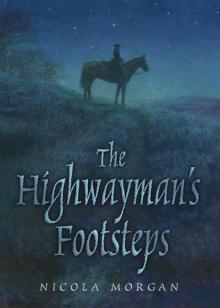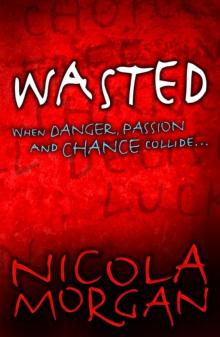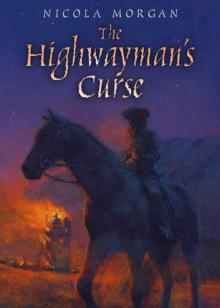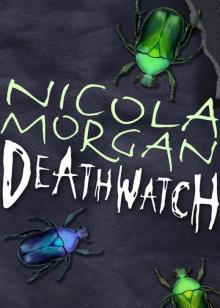- Home
- Nicola Morgan
Wasted Page 2
Wasted Read online
Page 2
She can only see one of his eyes because the other one is hidden by a flop of hair, but the one she can see is warm and blue, the lashes dark. Assuming that the other one matches, they are great eyes. Great hair too, obviously a lot of effort going on there. Sort of swooping bits at different angles. Like several ski jumps designed by someone with a sense of humour and serious engineering skills. Some streaks that might be the sun or they might not. Maybe he is one of the surfing types that hang out at the beach and get themselves looking all Australian. Though his skin looks a bit pale for that.
“But it’s only two weeks away. How can I learn the songs?”
“I’ll teach you. You can do it. You have the most brilliant voice. It’s perfect! We need you badly. You have to say yes. How can you not?” His words are falling over themselves.
She hesitates. Deliberately. Looks away from him, to hide her excitement. “Well, OK, but I can’t promise I’ll be able to learn everything.”
“Yesss!” And now he is smiling and his smile is… “Look, can I call you later and can you be free this evening? Here, write your number on this. And what’s your name?”
“Jess. And yes to the other things.” She writes her number on the scrap of paper he rips from a pile on the table. She feels his eyes on her as she writes. It’s not an unpleasant feeling.
“Thanks, Jess! I’ll call you later.”
“What’s your name?” But he has gone.
Jess is surprised to find her heart beating hard, her body hot and a smile on her face that will not go away. She closes the door, firmly, and tries to get back to the song she was singing, but it doesn’t work. She’s heard that Schrödinger’s Cats are good, even though they are just local. And even though they’ve got a weird name that sounds a bit pretentious. All at the sixth-form college, she’s heard. She almost went to a gig once but the bouncers had other ideas and her fake ID wasn’t good enough.
Her friends will be amazed when they find she is singing with the band that is playing at the prom.
Jack hurries through the school, along the familiar crisp-strewn corridors with their smell of disinfected toilets. He had known something would turn up and it has. This girl, Jess, that voice, the kind of Mediterranean hair, caramel skin and huge dark eyes, everything. She must be part Greek or Italian or something. He grins and is still grinning when he knocks on the door of Mrs Willow’s office.
He is about ten minutes late but her annoyance soon melts in the face of his charm. Jack has always got away with things. It’s difficult for an adult to believe that a boy with such a smile, such artistically arranged hair and two dead mothers to his name could mean any harm.
And he doesn’t. Mean any harm. But Jack is dangerous to know. He killed his first mother during his own birth, just by being born – a cerebral haemorrhage, horribly rare, and everything happened too quickly for them to save her. Chance in a million, the doctors said, shaking their heads, as his father held this wrinkled scrap of baby in his hands and wondered how he would get through the next few minutes, days, weeks. Obviously, Jack doesn’t remember that mother. His father married again when Jack was two years old. He does remember this new mother. She lasted three years, died when he was five, on his first day at school, and he was there that time too. She’d been playing football with him. In the kitchen. It was the sort of thing she did. Spontaneous, lived for fun, his dad said to him in later years. Didn’t do things the normal adult way. She loved mess and breaking rules and wearing the wrong clothes for the occasion – not that he remembers that, but his dad said.
His dad is the sensible, organized one, the one who thinks things should be done in their proper places, or chaos ensues. Trouble is, that afternoon his dad wasn’t there, otherwise the dishwasher would not have been open, the cutlery rack full, sharp knives pointing upwards, while his wife and young son were playing football in the kitchen. They should have been tackling Jack’s brand-new reading book, but while Jack was getting the book out of his school-bag, he had dropped the football he was trying to carry at the same time. And when the ball had rolled towards her, it had been too tempting to ignore, so she’d made as if to dribble it; which had been too tempting for him to ignore, so he’d responded by kicking a beaut of a shot straight past her to the imaginary goal in the corner. It was a game they’d often played. Nothing had gone wrong before. Apart from a broken plate once, but what’s a broken plate when you’re having fun?
“Brilliant!” she had shouted, a split second before losing her balance and falling backwards onto a long kitchen knife sticking up in the dishwasher rack.
He remembers that. He remembers laughing because she had looked so funny falling backwards, her face split open in wide-eyed surprise as she tried to grab something on her way down. Her shoes had made a funny squeak on the floor, he remembers, like a squashed mouse. Not that a squashed mouse is funny.
Then he’d stopped laughing. “Mummy! Get up! Get up!” But she didn’t get up. She didn’t move at all, apart from a strange juddering that he did not understand, until suddenly her body relaxed and he ran out of the kitchen. He could hear someone screaming and years later he realized that it must have been him, as there was no one else in the house.
Now “mother deceased” is in his school file. “Mothers deceased” might have been more accurate. So everyone knows that he is the boy whose second mother died on his first day at school, though often they forget, because he seems so OK. After all, it was many years ago now. There have been a couple of “aunts” and a couple of “friends” and Jack’s life does not lack a feminine touch. Social services were a nuisance at first, but they have long since given up, once they realized that Jack’s father could manage perfectly well. Jack’s father is not going to risk trying to provide a mother for his son again.
The result of this is that Jack has become dangerous. His first mother had been a mountaineer – she’d given up when she was pregnant with Jack and had planned not to go back to it. Too dangerous, she’d said, too dangerous for a mother. Bit ironic, that, thinks Jack when his dad tells him, much later, considering that becoming a mother was what killed her. His second one had been a stunt double in her younger years and had never had a serious injury. Then she plays football with a small boy in an ordinary semi-detached house in an ordinary town in England and look what happens.
Stuff happens, is what, thinks Jack. There’s no better explanation for half of it so people call it chance, though he calls it luck because he doesn’t believe in chance. Jack worships luck. He believes that you make your own. He has thought it through, with his philosophy course feeding his interest, and soon he will probably tell Jess about it because they will have many conversations over the next two weeks. That’s certain. You can see it in their eyes. One thing following from another.
Meanwhile, Jack has finished his meeting with Mrs Willow, and Mrs Willow is convinced that Jack has everything under control with his band. She trusts him, nice boy that he is, with that warmth in his eyes – or the one that she can see.
And Jess is almost home now, carrying her music-case as well as a bag of food that she’s picked up from the supermarket, because her mum won’t have. The air is heavy and damp with heat and the seaweed smell of a summer tide. A low sun glares in her eyes and her back feels sticky against her shirt. She is looking forward to a shower, changing, kicking off her shoes, something cold to drink, putting some music on. She’s looking forward to telling her mum that she’s in a band – in fact, joining a band had originally been a suggestion of her mum’s, instead of the more expensive route of music college. Though Sylvia may change her mind about that when she thinks about it more carefully.
Jess hums her new song as she arrives at the gate.
Her steps become a little slower as she walks up the garden path. Home is sometimes a difficult place to be, even though it can be the best place too, and she can’t be sure what mood her mum will be in. It will partly depend whether she’s sold a painting, which is what she was hoping fo
r that day. It’s been a long time since she has sold one and on the one hand it’s about time her luck changed; on the other hand, maybe she’s lost her creativity. That’s what Sylvia said, one evening recently, in a weepy session which began something like “What’s the point of any of it?” and finished with “What’s the point of any of it?” and another glass of wine downed quickly.
But most of all, Jess is looking forward to the moment when Jack will phone. Though she doesn’t know his name yet. Which makes her wonder if he is real.
Spike jumps off the top of the wheelie bin where he has been sunbathing and comes to rub his body against her leg. She bends down and strokes his hot black back.
Sweet peas and deep raspberry pink roses clamber up some twisty sticks in pots and their smell is rich and fresh. It makes her want to breathe deeply. If you could trap moments and memories in a jar to taste later, this would be one: before arriving home, before anything, waiting, hoping, wishing, an unspoilt feeling. The present. Jess desires the future, but she is sometimes afraid of it. It is tangled with uncertainty. At least the present is something she knows. She is torn.
Spike pushes ahead of her as she opens the door.
CHAPTER 4
WHAT THE HOUSE SEES
THE house is silent and airless. It has the stillness of a house that has fallen asleep through boredom while its occupants have been away. It smells of the morning’s toast. The post – nothing interesting – lies on the doormat. Breakfast dishes sit unwashed in the kitchen. The light on the answerphone is winking, and Jess plays the single message while she runs water and quickly does the dishes.
It’s her mum. The voice is all high and sing-songy. So, it’s been a good day. “Hi, darling. Um, you’re obviously out – sorry, I can’t remember if you said you had something on. I forgot to leave you a note. Hey – I called in at the gallery and guess what! They sold something! Yay! I’ll be back about six but then I’m going out with Julia, so you can get your own tea. And don’t forget to feed Spike!”
No, Jess will not forget to feed Spike. Jess never forgets to feed Spike. And buy the milk and bread and whatever they need. Though what will happen to Spike and the bread and the milk and life’s other essentials when she’s left home, who knows? And one day she will leave home, in the natural course of events. But Sylvia can’t talk about that, won’t think about it. And Jess is too afraid to push her. Sylvia has been left once, though it’s about seven years ago now, and she can’t bear to think about being left again. So she doesn’t. After all, she could be knocked over by a bus before then. Or slip on a banana skin. Or any of the other things that never happen. Like lightning striking twice. Something will turn up. Jess will just move down the road, maybe, which won’t really count as leaving. Sylvia can still call on her when she wants.
If there was a prize for burying one’s head in the sand, Sylvia would win it. The International Ostrich Prize for running from reality.
Jess feeds Spike and tidies the kitchen quickly. She runs the tap till it is as cold as it will get, pours some into a glass with juice, chucks in some ice, cuts a piece of cheese and twists off some grapes. Some of those flatbreads with seeds. A chocolate biscuit. She’ll make herself a meal later. Checks that there’s some pasta sauce and salad things. Her phone is sitting on the kitchen side. She keeps looking at it. Sure enough, it rings. And it is an unknown number, which probably means…
“Hi, it’s Jack.”
“Hi.” She opens the door to the garden and goes outside with her snack on a plate balanced in the crook of her arm, puts it on a rickety table and sits on the old swing hanging from an apple tree heavy with unripe fruit. Nearly six o’clock but the sun is still warm. It slants through the trees and toasts her skin. He’s easy to talk to and the words just glide from them both. There’s excitement in his voice, and she feels something spring alive inside her. She tells him a bit about herself, the songs she writes. They discover that neither of them has brothers and sisters.
“Just me and my mum. And cat,” she says. “My dad lives in the States. Chicago.”
“Just me and my dad,” he says.
“Your mum?” she asks. His answer comes so easily that she doesn’t even regret asking.
“She died. Ages ago.”
“Sorry.”
“Yeah, thanks. It’s OK. It was a long time ago.”
“So, when am I going to start learning these songs?”
They arrange that she’ll go to his house that evening. It’s fifteen minutes’ walk away and he will meet her halfway so she doesn’t get lost.
How charming. But then Jack is. It’s why adults like him. Despite the hair that swoops across his face and sticks out in strange shapes that defy gravity. Jess likes him for other reasons, and charming is not something she would have consciously valued. She likes him for his eyes and smile and because he likes her and because electricity travels across the space between them. It’s not complicated.
She does not know that he’s dangerous. He doesn’t look dangerous. But she wouldn’t mind if he was. It’s a chance she would definitely take.
She hears her mum come into the house. “Gotta go. See you seven-thirty.”
Jess goes back inside. She squints after the brightness of the garden. And shivers.
“Hi, Mum. Great news about the painting!”
“Oh, Jess, it’s fantastic!” Sylvia spins in a dance around the hall, scoops up Spike from a chair and buries her face in his fur. Spike is not entirely happy about this and wriggles away. Sylvia is wearing a floral drifty dress with thin straps. Her shoulders are tanned. Her eye make-up has slid into the cracks around her eyes. She kicks her feet from little sandals and bends down to rub a reddened toe. Jess’s mum is not used to wearing shoes. In her studio, shared with a co-operative of artists, she doesn’t wear any, though she’ll wear huge socks when it’s cold. And often she works outside, barefoot in the summer, maybe on the beach where she paints her favourite semi-abstract seascapes, trying to catch the light and the breeze and the smell of salt. Jess’s mum is creative and does things in creative ways that do not fit in boxes. It’s much safer in a box, but there are no rainbows.
Jess follows her into the kitchen and watches her pour a glass of chilled wine and drink a few fast sips before opening the fridge again to hunt for some food. Jess thinks she could do with a wash first – there is a cumin-seed smell of body odour. Her mum should not let herself go. But the thing is: she never actually had hold of herself in the first place.
Sylvia is plastering ripe Gorgonzola on an oatcake. Her blonde hair is long and wavy. Jess’s is dark and wavy, though not as dark as her father’s. Jess is a mixture of her mum’s Scandinavian paleness and her father’s Italian dark olive. Her own skin is a natural honey colour, as though permanently suntanned, but it annoys her because it seems to say something about who she is, and it shouldn’t. Half her father and half her mother, when she doesn’t feel like either of them. It speaks of their fractured family. Three separate people, with Jess in the middle, the magnet that draws them together and forces them apart.
“I’m celebrating with Julia tonight,” her mum says. “We’re going to that new restaurant and then maybe somewhere after that. Or we might both come back here.”
“I’m going out too,” says Jess.
“That’s nice.”
“Do you want to know where I’m going?”
“Sorry, where are you going?” Sylvia isn’t even looking at her daughter. She’s raiding the fridge. “Do we have any chutney? I’ve got a craving for chutney.”
Sylvia, the mother, should know if they have any chutney. It is not Jess’s responsibility to know if there’s any chutney in the house, since she doesn’t eat it.
“It’s in the door of the fridge, Mum. I’m going to meet someone who has a band. He wants me to be the singer.”
“Are you sure?” What sort of question is that? What does Sylvia mean? Does she not trust her daughter to know?
“Yes, I’m sure.
We’re going to be playing at the leavers’ prom.”
“That’ll be fun. Did you get some more bread?” Sylvia is looking in the bread bin.
“Yes, here – I haven’t put it in the bread bin yet.”
“Thanks.”
“Mum, it’ll be more than ‘fun’. This is serious. It’s a band. It’s what I want to do. They’re really good.”
“That’s lovely, darling. Listen, I’ve got to rush. You know what Julia’s like.”
The phone rings in the hall. Sylvia stares at the glass in her hand and pops a lump of cheese into her mouth. “Get that, will you, Jess? I’m going to run a bath.”
Jess goes out to the hall and picks up the phone. It’s one of those companies pretending not to sell things. The person asks how she is. Jess deals with it by saying, “Very well, thank you. Bye,” and putting the phone down. She is about to go back into the kitchen but she stops when she sees her mum swig from the wine bottle. Two long, slow glugs. Jess feels sick. She has been trying to ignore this, pretend it isn’t happening, that it’s her imagination. Is her mum just drinking a bit too much or is she an alcoholic? Jess doesn’t know when one becomes the other. She’s never seen her really drunk. Or maybe once, about a year ago, but that seemed a one-off after a night out with Julia. But sometimes she stumbles or slurs a bit in the evenings and says, “Gosh, I’m tired tonight.” There’s been no sign of her drinking early in the day and that’s supposed to be important, isn’t it? Unless she’s hiding it. But she certainly drinks every night. Quite a lot. Is it normal to drink from a bottle? When you’re a middle-aged woman, not some kid trying to get wasted on supermarket vodka?
Jess doesn’t want to have to deal with this. She shouldn’t have to.
She doesn’t go back into the kitchen. “I’ll see you later – I’m going to have a shower, OK?” And she goes upstairs to her room and puts some loud music on. Heavy rock, which is not what she usually sings. It’s music with power. The thunk of the bassline is thick like treacle, the voice a rich coffee, smooth and strong with a rough edge. It wraps its arms around her.

 The Highwayman's Footsteps
The Highwayman's Footsteps Wasted
Wasted The Highwayman's Curse
The Highwayman's Curse Deathwatch
Deathwatch